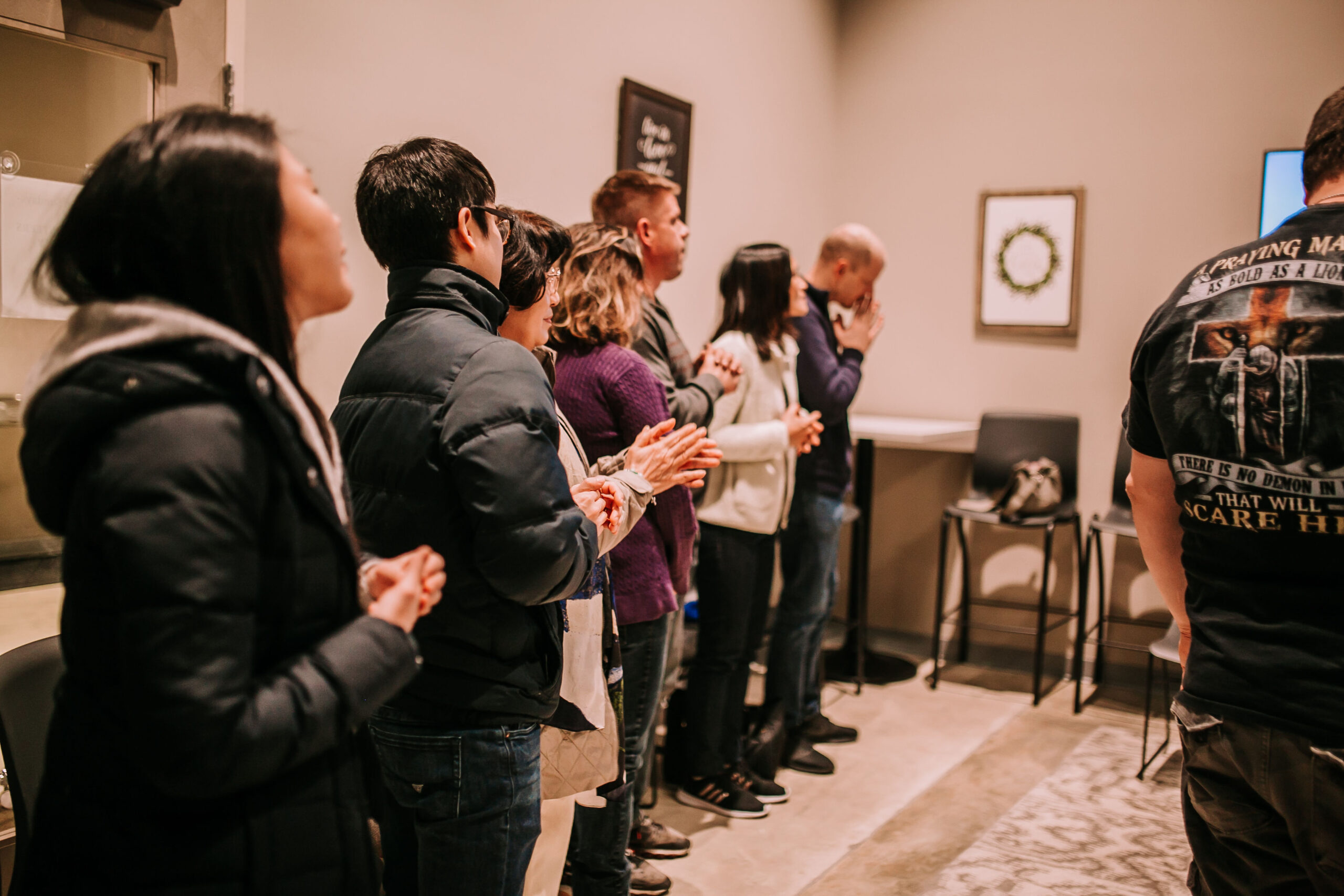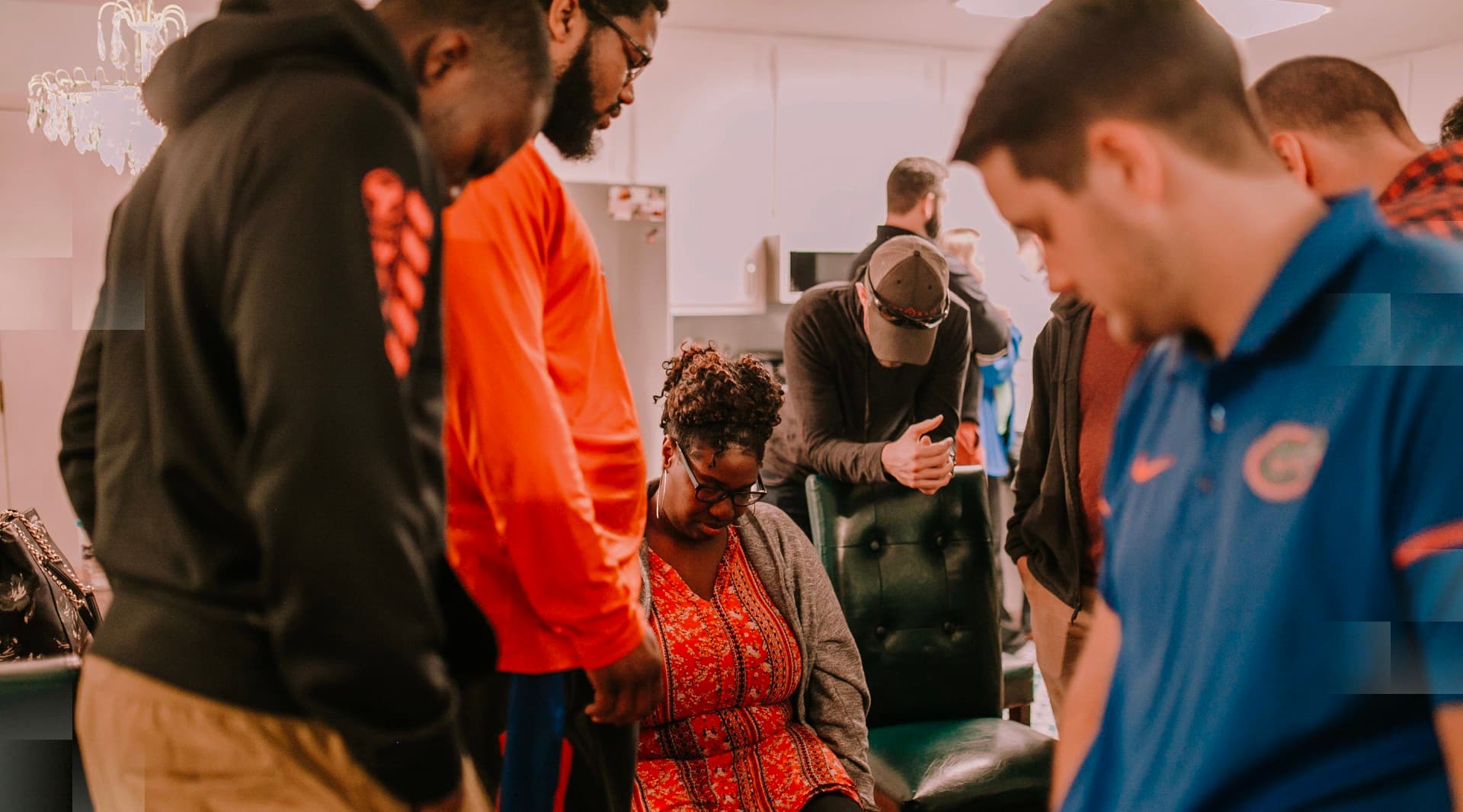Join a community
Microchurches
We take the call to make disciples seriously, but discipleship and following Jesus can’t be done alone.

How Microchurches Differ From Small Groups
People often confuse or compare microchurches with small groups. The difference, however, could not be more drastically different. There are seven key elements that mark the uniqueness of the microchurch expression as it is manifested within Greenhouse.
1. Microchurches are the church.
2. Microchurches do not serve Sundays.
3. Microchurches are formed around the calling of the MC leader.
4. Microchurches are where the APEST thrives.
5. Microchurches equip the saints to do the work of the ministry.
6. Microchurches are structured to be discipleship hubs.
7. Microchurches are unashamedly multiplicative.
Microchurches are the church.
two hours a week on Sundays. The earliest church methodology we see in the New Testament reveals that churches were not defined by a structure, but more by the assembled gathering of God’s people.
Read the following passages of Scripture and ask yourself this question:
“What geographical area is being described?”
• Colossians 1:18 – the church throughout the world
• Acts 9:31 – the church throughout a region
• 1st Corinthians 1:2 – the church in a city
• Romans 16:5, 10, 11, 14 – several house churches within one city.
Biblically, the word “church” is not relegated to a structure or a place. It
seems to be any local group of any particular size or structure that is
gathering in the name of Jesus. Scripture seems to infer that any part of the
universal church that is locally based can be defined as a local church.
This, however, is not enough of a definition to accurately describe church. Just because three Christians hang out together does not necessarily mean
church is taking place. The New Testament church gathered with purpose and strategic intent of fulfilling what Jesus said is the greatest commandment (Matt 22:37-40) and to walk in obedience with the Great Commission (Matt 28:19-20). Everything, according to Jesus, flows out of
these two foundational imperatives. The Great Commandment calls us to love the Lord our God with all our heart, soul, mind and strength and to love our neighbor as ourself. The Great Commission is the clarion call for all
believers in Christ to go and make disciples. At Greenhouse, we say that this embodies the three elements that make up what we call living in the green:
worship (loving God), mission (loving the lost), and community (loving fellow
believers).
These three elements function as our ecclesial minimum, meaning that if worship, mission, and community are present, we believe that the church is
present. It does not matter if there are four people in the room or 4,000. The church is alive, active, and healthy if these three components are in play. A Sunday gathering of God’s people can be defined as church. A microchurch
that meets in a living room, downtown in the streets, or in a detention center
is just as much a valid and vibrant expression of the church as well. For us,
size doesn’t matter: the content and expression does.
This delineation is one of the primary variations of a microchurch and a small group. Small groups are often an offshoot of a Sunday gathering that serves
the purpose of cultivating community amongst members of a Sunday-centric
church. Often, elements of community and sometimes worship takes place. Rarely, however, do small groups embody mission alongside worship and
community. (If they did, however, we would say that that is a church!)
Microchurches are the church. If you stated that you only had two hours a week to give to Greenhouse and asked whether or not to go to a Sunday
gathering at Greenhouse or a microchurch, we would send you to a microchurch. The fullness of the microchurch expression when it is working right is the optimal place to grow in your love for Jesus, get discipled by others, and be empowered to be and do everything that God has called you
to!
Microchurches do not serve Sundays.
Small groups are usually seen as a ministry that serves as a continuation of
the Sunday gathering. Small groups often are directed by the church staff on how that small group can help bring home the Sunday message with a sermon discussion guide or a preset curriculum that is mandated of these
small groups to do. They are seen as a supplemental ministry that helps to further the cause and the vision of the larger church that meets on Sundays. How they meet, when they meet, and what is available in those meeting times are almost always dictated by the paid church staff.
Microchurches, however, do not serve the Sunday gathering. Since microchurches are seen as a full expression of church, the vision, purpose,
and focus are not at all dictated by Sundays or the church staff. They are
autonomous expressions of church that have an agreed upon decentralization from the weekend gathering. If anything, we feel that the
Sunday gathering should serve the microchurches and the visions that they
have and not the other way around! We don’t consider ourselves a church with microchurches; we see ourselves as a collective of microchurches that
choose to gather together on the weekend.
Microchurches are formed around the calling of the MC leader.
received. The word calling here in the Greek, klésis, speaks of the divine
invitation to embrace salvation in the kingdom of God. In Ephesians 4:1 specifically, calling is used of one whom God declares worthy of the calling which he has commanded to be given him or her, and therefore fit to obtain the blessings promised in the call. Part of the blessing of salvation is to not
wait until heaven to fully embrace and experience the abundant life that
Jesus has made available to us! So many Christians waste their life with a half-in-half-out mentality when it comes to following Jesus and miss out and the exciting adventure of obtaining the blessings promised in the call to
follow Jesus!
Part of this blessing found in Christ is finding your purpose and calling in life. There is no greater joy than embarking on a deeply fulfilling journey where
the core of who you are comes alive because you get in touch with your
divine spark, inspiration, and calling and then go do something with it. 2nd Peter 1:3 says, “His divine power has given us everything we need for life and godliness,” and when we actually tap into this, life burst forth and we truly live. When we get in touch with our calling, scales fall off our dulled
eyes and we see things in vivid color. Our heart ignites with passion and
purpose and the longings we try to fulfill with sex, careers, money, and
significance in other places begin to taste like ash in our mouths compared
to the surpassing greatness of partnering with God and seeing the Kingdom come on earth as we burst forward with purpose and intent.
Getting in touch with your God-given calling is one of the most exhilarating
aspects of our walk with Christ. It is like waking up and realizing that the
things you have only dreamed about doing are actually within your grasp.
The fulfillment of truly becoming a contributing member of the Kingdom team and seeing the tangible fruit that comes with it sparks our souls like nothing else.
With this in mind, microchurches are the incubators of the callings of the
people of God. Microchurches are the environments and laboratories where callings are catalyzed and forged within a community of like-minded believers. Microchurches are where people dare to dream with Kingdom vision and then mobilize those dreamers to make it a reality. Small groups are realizing the dreams of a senior pastors; microchurches are empowering
the saints to fulfill the call to live a life worthy of the callings they received.
Microchurches are where the APEST thrives.
Following the Pauline discourse in Ephesians 4, Paul continues on to give
some very clear directives of how the church should be built up. Ephesians 4:11 speaks to the necessity of the presence of apostles, prophets, evangelists, shepherds, and teachers (APEST for short). At Greenhouse, we
take that call very seriously. From this Biblical perspective along with decades of empirical evidence launching, leading, and coaching hundreds of microchurches, the formula remains the same: when a microchurch is green,
has a vision of multiplication, the APEST is fully present, the microchurch
thrives. Where there is a deficiency of one or multiple APEST giftings, the
microchurch remains off-kilter and not as healthy as it could or should be.
Most small groups don’t even consider the APEST as anything other than a
verse to be studied in the Bible study going on within the small group. The focus and intent of a microchurch, however, is to have a full-bodied representation of the church. An emphasis on the APEST, then, is a critical piece to a healthy, growing microchurch.
Microchurches equip the saints to do the work of the ministry.
saint to do the work of the ministry. These leaders are activating and enacting their God-given call and mobilizing the church around that call. A good microchurch, however, is not just catalyzing one person, but every
member involved. Small groups usually have a designated leader/facilitator
that simply administer the sermon discussion guide or curriculum and take care of the administration and leadership of the group themselves.
Microchurches, however, are the church. Within the church, there are
multiple roles and responsibilities that necessitate others involvement as well.
This is also where the APEST comes into play in a critical way. Microchurches
are where every gift can be actualized, empowered, and celebrated. No one
leader represents all five of the APEST giftings. We were designed to need one another to full carry out the callings and purposes of God. With this in mind, the microchurch leader is being called to lead, but by default, that
leader is calling others to join them in this Kingdom pursuit and mobilizing the church, the people in his or her microchurch, to help the do the work of the ministry as well. The microchurch model has a built-in divine design that encourages every member to actively participate in the building up of the
church being formed in the microchurch expression.
Microchurches are structured to be discipleship hubs.
If you follow the progression of the aforementioned points, the fact that
microchurches function as discipleship hubs should go without saying. It is, however, such an important point, I am going to say it! Sundays alone
cannot make disciples. The proof is the American church of the last century
and the radical lack of disciples in our midst.
When successful revivals occurred throughout history, subsequent disciple-
making structures sustained them. The Wesleyan revival, for example, formed three distinctive gatherings for post-conversion believers: societies,
classes, and bands. Societies are akin to Sunday morning church gatherings
or when Jesus spoke to the multitudes. Classes took a similar form as a small group or microchurch, or like Jesus’ twelve disciples. And bands functioned as a core discipleship group, much like Jesus’ inner circle of James, Peter and John. You will find similar structures within all of the mighty moves of God that had any staying power because John Wesley and other great leaders within church history understood that unless someone gets more than just a
Sunday message, their lives will not be transformed into the fullness of the
image of Christ.
Microchurches serve as the place where life on life discipleship takes place. This can and should happen in both organized and organic ways throughout the week. Microchurches allow for relational equity to be built and to provide
an environment for leaders to find their own James, Peter, and Johns to take under their wing and disciple. Again, as leadership is disseminated within the microchurch, disciple-making goes beyond just the functional leader of the microchurch. Disciple-makers are raised up and encouraged to find others to disciple within the microchurch setting. This allows for personal discipleship
that are unavailable to happen within a Sunday gathering to take place.
Most small groups do not have a vision for anything other than the teaching that takes place week to week. There is a we-meet-once-a-week mentality in small groups where the question of “Who can I be discipling?” is not being asked or vision casted. In microchurches, this is a constant drive and
question that remains a core component of a healthy microchurch.
Microchurches are unashamedly multiplicative.
adamantly opposed to multiplying small groups. The prevailing train of
thought is centered around the idea that the relational break and angst that
multiplication would bring to the people who have spent all this time growing
in deep relationship with each other would be detrimental and unnecessarily
painful for those who are a part of the small group.
This train of thought, however, is a very self- centered, American way of thinking and is the absolute anti-thesis of what we see in the Scriptures or
even in God’s created order. Every living thing on this earth is designed to reproduce. Trees reproduce more trees. Fish reproduce more fish. Humans reproduce more humans. Life gives birth to new life. It reproduces. It
multiplies. In the same way, disciples reproduce disciples. Multiplication is
the natural by-product of growth and the way DNA is transferred from one generation to the next.
We see this as no different regarding spiritual DNA. We strive to impart what Jesus has entrusted to us to the next generation, who will then reproduce that into the next generation with everything we do. Microchurches multiply in healthy and strategic ways that allow for relationships to continue and thrive without losing the Biblical mandate to proliferate God’s message and His church. Microchurches look beyond the self-centered desire to keep the Gospel truth and rich and deep community to ourselves and eagerly desire
and anticipate the day that we can multiply the beautiful community that is
expressed so that others can partake in the same type of koinonia who are
not currently doing so.
A chance to develop real friendships
We know how hard it is to have the time to develop real friendships, which is why we created microchurches to be a place where you can belong, grow spiritually, and be empowered to do what God has called you to do.
Find your Microchurch
Microchurches are gatherings of 5-40 people committed to living life together and growing as disciples of Jesus who meet weekly in homes, online, on college campuses, and other venues all throughout Gainesville and its surrounding cities and bring the revolution of the Kingdom here on earth.

Why you need a microchurch
Church extends beyond the walls of a Sunday gathering, and we need each other on more than just Sundays to bring this mandate to life. Discipleship is an integrated call to live life with other believers and those who do not believe yet to bring the Kingdom of God wherever we go. We take our cues from Scripture and regularly gather with smaller groups of people on at least a weekly basis to form the church around this pursuit.
A chance to develop real friendships
We know how hard it is to have the time to develop real friendships, which is why we created microchurches to be a place where you can belong, grow spiritually, and be empowered to do what God has called you to do.
The space for you to grow spiritually
We believe that Microchurches provide the chance to experience a community of Jesus followers that encourage and support your walk with Jesus throughout the week.
Fellowship that helps you to be empowered
In a Microchurch community, you will be able to find people who God has called into your life so that you can be empowered to go and do what He has called you to do.
Created for more: the Microchurch Promise
We don’t want you living this life with Jesus alone and not becoming the world-changer you were created to be. If you need help finding the right microchurch, give us a call or email one of the microchurch team members so we can schedule a meeting and help you find the right microchurch.


